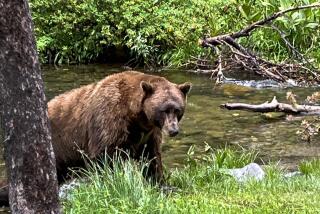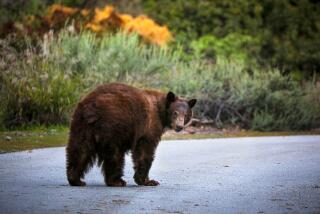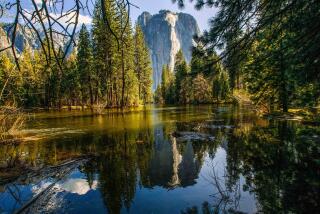There’s no doubt who’s boss
Unless you grew up in rural Alaska, where fear of bears shaped all behavior, where you never fished without a gun, never slept well in a tent, never hiked in silence, never camped with a dog — unless you knew these things, you could not understand how it felt to learn that your sister had arranged for you to sleep with grizzlies.
Trena’s promise had been of an “amazing fishing trip” in Alaska, 16 years after I left the state. So I flew 4,500 miles home. While waiting for luggage at the Anchorage airport on a July day in 1995, she disclosed that the site of our adventure was “a bear preserve.” My fishing buddy heard the words too. He was Ed Wiley, a beefy 6-foot, 3-inch former college basketball player and fellow Washington, D.C., city boy. He didn’t do bears either.
Does Dad still have the thirty-aught-six? I asked, referring to a rifle I carried fishing as a boy.
Doesn’t matter, she said. It’s a federal bear preserve. Guns aren’t allowed.
But bears are?
Trena looked deflated. We went for drinks. She told us that in six decades, only one visitor had been attacked at the Brooks Camp preserve. Rangers live there all summer, quite safely. Besides, we had already come this far, already paid for reservations. Her clincher: The salmon roll up the river in waves.
We could not know that as we flew to the camp in Katmai National Park the next day, a grizzly would kill a woman and her son-in-law as they jogged on a trail just outside Anchorage.
At Brooks Camp, our floatplane taxied to shore near a hard-sided ranger cabin, where we heard a 15-minute talk about surviving our five days. Rule No. 1: The bears are in charge. Also: Don’t try to interact. Always make noise. If you see a bear coming, stop, start yelling, wave your arms and back away slowly. Do not run. Running triggers what rangers slyly refer to as a “predator-prey response.”
Warily, we pitched a tent and walked half a mile to the fishing stream. A “bear tower” stood on the bank behind us. As we made our first casts, someone screamed, “Bear!” I looked left, upriver, 150 yards to where the stream grew wide and shallow. Sun danced off the riffles, the water flowing gently between islands of grass as green as my face, for hurtling toward us through the shallows was a grizzly the size of a medevac helicopter. His enormous paws flung spray 15 feet in all directions. Birds tore for the sky. The water boiled white from salmon furiously seeking anywhere else.
We turned and sprinted for the tower. As we raced up it, the bear lunged headfirst into the waist-deep pool where we had been fishing. He thrust his front legs forward and down as if butterfly stroking, then crashed his claws together at a point just beneath the surface. The water exploded as fish leaped or writhed madly toward the bank. Faster than you can say “tourniquet, please,” he surfaced with a salmon in his teeth.
Then came a voice from a foot away: “Oh my Gawwd.” It was Ed, a good Baptist. For the next half-hour, as the bear snagged and devoured half a dozen fish, Ed would repeat the phrase 4 million times.
I spent my youth in Alaska believing in a sort of bush algebra: Humans are to bears as ants are to squish. I had never truly watched a bear. When I saw one, I vamoosed. Now this, 20 feet below. The speed, at 900 pounds; the utterly feral aggression; the arrogance. Ed pointed to his knees. They were shaking.
The scene was to play again scores of times over the next five days. We survived, living near and avoiding dozens of bears, following the ranger’s instructions meticulously, always tense.
Four years later, after moving to Los Angeles to work for The Times’ Sunday magazine, I received a videotape and letter from someone suggesting that we write about Timothy Treadwell, who spent summers communing with bears in Katmai, not far from the bear preserve. The video showed Treadwell in a sunny field of grass, green as the islands at Brooks Camp. Instead of keeping his distance from bears, he walked toward them. He spoke of them as friends.
A few weeks later, Treadwell called. He talked about knowing bears as individuals and he said they sensed his love for them. He was gentle and sincere, a missionary. We could not make him a role model. We would not write about him.






